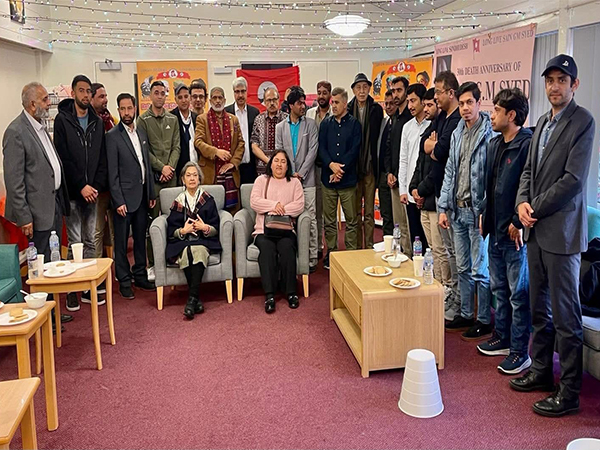London [UK], April 28 (ANI): The Jeay Sindh Freedom Movement (JSFM) held a commemorative event in London on Saturday to mark the 30th death anniversary of Sain G.M. Syed, a leading figure of the Sindhi independence movement, an official press release stated.
The gathering drew political and community representatives from Sindh, Balochistan, Pashtunistan, Kashmir, and Gilgit-Baltistan.
The event commenced with the national anthem of Sindhudesh, followed by floral tributes and the lighting of candles before portraits of national martyrs. Participants reaffirmed their commitment to continuing the political struggle envisioned by Sain G.M. Syed. Poet, writer, and lawyer Mansoor Hub, a follower of Syed’s philosophy, moderated the proceedings.
Addressing the event, Suhail Abro, Chairman of JSFM, said, “We are followers of Sain G.M. Syed! We reject the State of Pakistan and are ready to make every sacrifice for the freedom of Sindhudesh. No conspiracy to seize our land, resources, and the River Indus will ever succeed. Our land, our identity, and our freedom — we have an inherent right to them. Our national struggle will continue until Sindh gains its independence.”
Hasan Dost, Central Junior Joint Secretary of the Baloch National Movement (BNM), stated, “The message of Sain G.M. Syed and the Baloch martyrs is to shake every throne built on tyranny. Sindh and Balochistan will write a new history through their freedom.”
Other speakers highlighted the broader struggle of nations seeking self-determination. Sajjad Raja, Chairman of the National Equity Party JKGBL, called Sain G.M. Syed’s efforts “a beacon of hope for all nations under Pakistan’s imperialist occupation,” while Imdad Odho, Senior National Leader and Director of Radio Voice of Sindh, emphasised adherence to “non-violent political struggle based on universal principles.”
Ali Khan, a Pashtun leader, underscored the importance of exposing rights violations internationally, urging unity among oppressed groups. Sajjad Hussain from the United Kashmir People’s National Party (UKPNP) noted, “Sain G.M. Syed parted ways with Muhammad Ali Jinnah even before the creation of Pakistan. He dedicated his entire life to the struggle for an independent Sindhudesh.”
Anu Mir of Insight UK conveyed solidarity with the Sindhi nation, supporting a vision of peace and progress. Ali Noonari, an exiled leader of the Sindhi National Movement based in Germany, said, “In a free Sindh, a system based on human rights will be established, where every individual will have the right to Sindhi citizenship.”
Speakers including Kamran Jatoi and Masood Imam drew attention to Sain G.M. Syed’s contributions as a social scientist and condemned the Pakistani military’s actions in Pashtun regions. Khursheed Baloch of the Baloch Human Rights Commission and Ali, a senior Pashtun leader, called for greater international cooperation on human rights and recalled Syed’s 32-year imprisonment for advocating Sindh’s freedom, the press release stated.
Several joint resolutions were adopted during the event, including demands for the recognition of the right to self-determination for Sindh, Balochistan, Pashtunistan, Kashmir, and Gilgit-Baltistan, and condemnation of enforced disappearances, extrajudicial killings, and political abductions.
The resolutions also called for an international investigation into human rights violations in Pakistan and emphasised the need to strengthen alliances among oppressed nations.
Specific resolutions passed included opposition to new canal constructions on the River Indus, expansion of campaigns for the release of forcibly disappeared activists, condemnation of the attack on Hindu tourists in Pahalgam, Kashmir, and a renewed commitment to promoting Sain G.M. Syed’s peaceful philosophy internationally.
The ceremony concluded with participants paying tribute to national martyrs and reaffirming their pledge to continue their respective struggles. Leaders emphasised that oppression, enforced disappearances, and political crackdowns would not deter the movements for self-determination.
They expressed confidence that Sindhudesh, Balochistan, Pashtunistan, Kashmir, and Gilgit-Baltistan would eventually achieve freedom. (ANI)
Disclaimer: This story is auto-generated from a syndicated feed of ANI; only the image & headline may have been reworked by News Services Division of World News Network Inc Ltd and Palghar News and Pune News and World News
HINDI, MARATHI, GUJARATI, TAMIL, TELUGU, BENGALI, KANNADA, ORIYA, PUNJABI, URDU, MALAYALAM
For more details and packages













